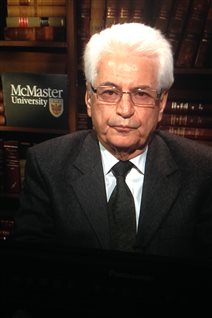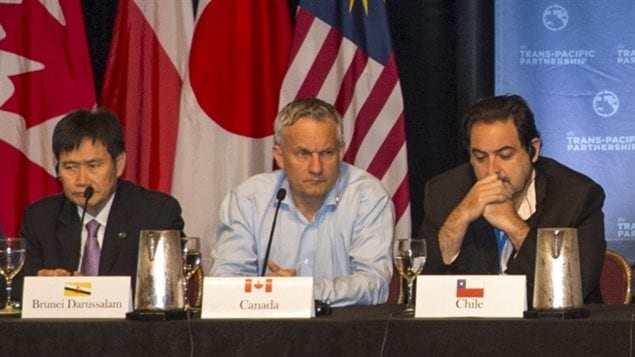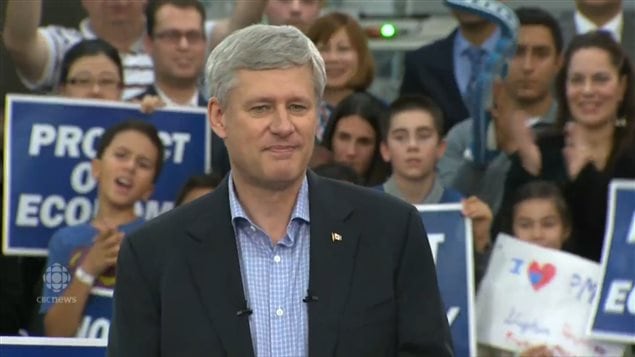The Trans-Pacific Partnership is a vast, comprehensive 12 nation deal, which includes Canada.
Many promises have been made to Canadians about how it will open up new markets for Canadian goods.
Atif Kubursi (PhD) is professor emeritus of economics at McMaster University in Hamilton, Ontario, a former Senior Development Officer with the United Nations Industrial Organization, and former acting Under Secretary-General of the UN, Economic Social Commission for Western Asia.
Listen
After several years of quiet negotiations, mostly behind closed-doors, this next multi-national has been completed. The TPP countries are Canada, U.S., Mexico, Japan, Vietnam, Australia, Peru, Malaysia, Brunei, Chile, New Zealand and Singapore, together representing some 40 percent of the world’s economy.
Prime Minister Stephen Harper, in announcing the signing says it will help create 1.3 million jobs.
Although details have not been released, some of the broader aspects of the tentative deal have been announced.
Japanese tariffs on Canadian beef for example will be phased down over 15 years from the current 38 percent to nine percent, while tariffs canola, fish and seafood, forestry products and industrial goods will be eliminated or phased out over the next five to 15 years.
Many in Canada were concerned about what was being “traded away” in order to achieve agreement.
Billions of dollars promised to offset affects in auto and farming sector
There were great concerns in certain farming sectors, and in auto parts for example.
The deal will see the requirement for Canadian content in autos sold in Canada reduced from 62 percent NAFTA production, to 45 percent from TPP countries, in other words a much reduced content from Canadian auto parts suppliers. The Prime Minister in announcing the deal pledged 1 billion dollars over ten years to help the Canadian auto sector.

The dairy sector was particularly concerned, but the first statement from the Dairy Farmers of Canada said, “”We recognize that our government fought hard against other countries’ demands, and have lessened the burden by announcing mitigation measures and what seems to be a fair compensation package, to minimize the impact on Canadian dairy farmers.”
However, the president of the National Farmers Union, Jan Slomp is among those who are remain very concerned about the deal and its affect on farmers and taxpayers.
“The federal government’s promise of a $1.5 billion compensation package for loss of quota value over ten years and $2.4 billion for loss of income over 15 years seems unnecessarily high if we are only talking about a 3.25 percent dairy quota cut”, he said. “This large dollar amount suggests that the intent is to completely dismantle dairy supply management over the next ten years.

In a press release on Monday Mr. Slomp added, “Most countries protect and support their domestic dairy markets and subsidize their farmers. Canada’s system does not require taxpayer support, and farmers obtain a fair return from the market. Dairy farmers in export-oriented countries, including TPP participants New Zealand, Australia and the USA, are suffering from their countries’ failed policies,” Slomp added. “Sacrificing our farmers and destroying a system that works for Canadian farmers, consumers, processors and taxpayers will not solve New Zealand’s problems. Supply management should have been kept right out of TPP negotiations.”
Trade deals only represent “potential” increase
Professor Kubursi, also notes that Canada has recently signed separate trade deals with South Korea and Chile, and yet Canadian exports have declined. He says Korean imports have increased by eight percent, while Canadian exports have not only not increased, but declined by seven percent. He notes the trade deal with Chile has resulted in no improvement at all, “it was a billion dollars before, it’s a billion dollars after”.

He also points out a drawback that no-one seems to have mentioned, which is the environmental footprint of shipping goods, such as auto parts, dairy (milk butter cheese) and poultry. Previously sourced from within Canada, and distances of perhaps less than a couple of hundred kilometres, now may come from thousands of kilometres away.
He also notes that should a country decide that the deal is not beneficial, it’s also much harder to withdraw from such trade deals at a later date than it is to get into them.







For reasons beyond our control, and for an undetermined period of time, our comment section is now closed. However, our social networks remain open to your contributions.